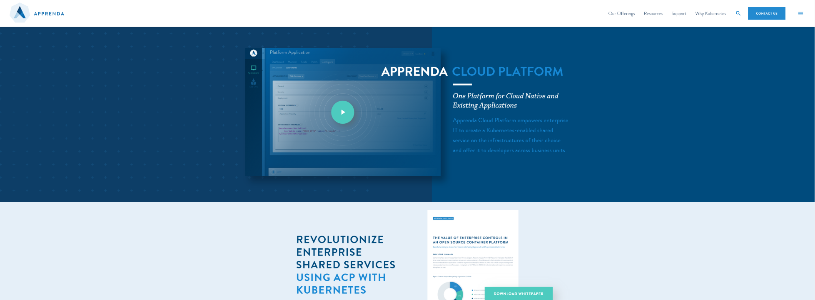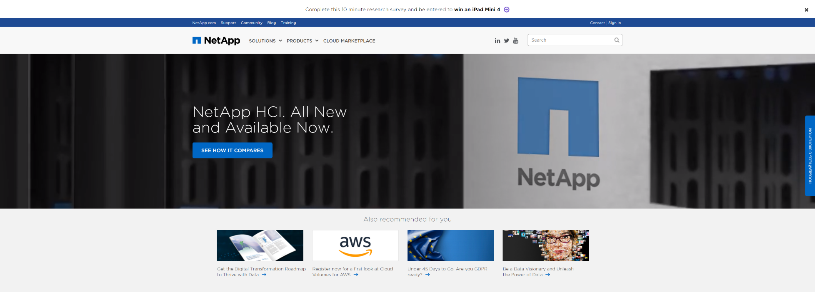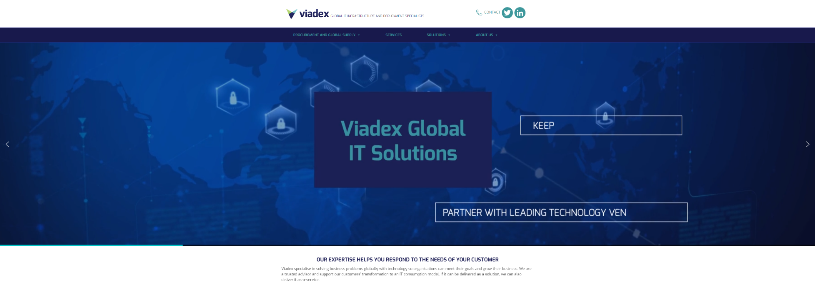Top 10 Best Private Cloud Infrastructure as a Services
Private Cloud Infrastructure is a model that uses computing power within the specific environment of the operator. It is used this way when privacy is the main consideration.
More control is achieved through this pool of resources and is pegged as more valuable to you. The technicalities involved in Private Cloud Infrastructure is considered private but the degree of privacy varies with the specific user. This is contrary to the public clouds that have many users and use resources from different networks within the domain of the public. The private cloud is ideal for companies that need to keep their privacy and are also concern of the security of their data. This makes this option the best for you in those cases.
Read More: Top 10 Private Cloud Providers
The following features make Private Cloud Infrastructure the ideal option for you.
- Enhanced Privacy and Security: The privacy of your organization is guaranteed through the use of the private cloud. Ideally, the security and your privacy is ensured. There is no sensitive information that can be accessed by the public or unwanted persons. As compared to public clouds that compromise with your privacy, this cloud stands out as unique and protects you from unwanted parties. All the operations of the company will remain to be private and hence making it the best option for you.
- Uninterrupted Control: This is in terms of access. There is only a single access by one specific organization. This will give you the opportunity to control all the activities without interference. Private clouds are a perfect solution to your needs as there is no interrupted access to this network. The management of this cloud is also easy owing to personalized control and access. You can even flip the switch off !
- Cuts on the Total Costs: Private cloud infrastructure helps in the proper allocation of resources and this ensures that no extra costs are incurred in external providers. These networks also ensure efficiency in the utilization of the available resources as compared to the traditional networks like LAN that do not maximize the use of resources. This ensures that the company is shielded from extra expenses incurred from public clouds.
- Reliability is assured: This network creates a ready environment as compared to any network. This makes it very reliable especially through the creation of a virtual environment that works to the best of your interest. Through making good use of the resources that would otherwise gone to waste, this public cloud infrastructure is pegged on as reliable, convenient and friendly.
- Bursting is Possible: Bursting is made possible by a number of providers who may create a public network within the domain of a private cloud infrastructure. This serves in creating and freeing up more space for your use that is rapidly available. There is also the possibility of fusing the private cloud infrastructure and the public cloud to come up with a hybrid network that boosts efficiency.
Read More: Top 6 Open Source Cloud Computing Software
Private Cloud Infrastructure is the perfect solution to your organization. This is because, the cloud works towards bringing out the best out of your company by boosting efficiency and performance. It is also crucial in ensuring the security of your organization as well as your privacy.
It is time to move away from traditional networks and embrace the private cloud. Experience a new world in this appalling infrastructure. Private Cloud Infrastructure is what will make a permanent difference for you and your company.
Read More: Top 10 Best Cloud Computing Providers for Small Business
Top 10 Best Private Cloud Infrastructure as a Services:
REDHAT
Red Hat is the world’s leading provider of open source solutions, including reliable, high-performing cloud, virtualization, storage, Linux, mobile, management, and middleware technologies. We also offer award-winning support, training, and consulting services.

REDHAT
BELLTECHLOGIX
Bell Techlogix provides our clients a fully managed private cloud solution stack. We’re a leading information technology managed services & solutions company focused on global enterprises, mid-market companies & educational institutions.

BELLTECHLOGIX
EQUINIX
Equinix is the world’s largest IBX data center & colocation provider, offering the fastest application performance, lowest latency routes worldwide and a digital ecosystem for financial, content or rich-media, enterprise, and cloud networks.
Building private clouds in Equinix expands your connectivity options. It also enhances IT agility by putting you in the prime position to integrate cloud and IT services down the road. When it’s time for your business to add new technology capabilities or migrate to hybrid cloud computing, you’re already where you need to be—among the data center industry’s largest ecosystem of ICT providers.

EQUINIX
APPRENDA
Apprenda is a software layer that transforms any infrastructure into a policy-driven, hybrid cloud application platform.

APPRENDA
VIRTUSA
Virtusa provides a broad range of IT consulting, systems implementation and application outsourcing services through an optimized global delivery model.

VIRTUSA
NETMAGIC
As a leading Managed service provider with datacenters in India, Netmagic solutions, fulfills your entire IT infrastructure requirements: from collocation services to backup solutions.

NETMAGIC
LOGICWORKS
Logicworks helps companies build and maintain their cloud infrastructure. We provide cloud managed services for AWS, Azure, and hybrid cloud.

LOGICWORKS
NETAPP
NetApp is the data authority for hybrid cloud. We provide a full range of hybrid cloud data services that simplify management of applications and data across cloud and on-premises environments to accelerate digital transformation.

NETAPP
RIGHTSCALE
Get RightScale Cloud Management to save money and streamline operations across any cloud, any server, and any container.

RIGHTSCALE
VIADEX
Viadex have the technical and strategic ability to design, source, configure, deploy and support your technology solutions around the globe.

VIADEX
The private cloud involves a divergent and secure cloud-based environment, in which only a specific client is authorized to operate. This model of computing, provides power within a virtualized environment while making use of a fundamental pool of physical computing resource.
Nonetheless, under this private model, the cloud is accessible by a single organization giving the organization greater control and privacy.
When building a private cloud strategy, the following are the infrastructural requirements that you need to fulfill:
Heterogeneous Systems Support
The cloud management solutions must be compatible with the latest hardware, software and virtualization solutions. Also, they should integrate efficiently with existing and traditional IT data center’s infrastructure. The heterogeneous systems support will enable you to backup all your data regardless of their format into your private infrastructure efficiently.
Service Management
This cloud computing strategy requires for the administrator to have a simple tool for metering and defining service offerings. Metering enables your administrators to productize the functionality of your strategy thus saving costs appropriately. Moreover, after the cloud is productized, your private cloud will deliver consistent service offerings. A service offering is a quantified set of applications and services that your end users will consume through your cloud computing services provision.
For your private cloud to operate efficiently, it must include billing cycles, resource guarantees, resource management and metering rules. Service management should be intensively integrated with the storehouse to enable your end users to manage and deploy their defined services quickly.
Dynamic Workload and Resource Management
Your cloud should always be workload- and resource- aware of enabling you to meet consistently your consumer service level agreements. This ability will also allow your private cloud to maintain its elasticity and remain truly on-demand. Through this elasticity, your management systems will have the capability to create policies around workload and data management to increase efficiency and performance of the computing system.
As your systems hit the peak demand, their performance must be precise and consistent. Your private cloud operates best that the public cloud during peak demand because it can dynamically prioritize systems and resources to meet the needs quickly and accurately.
Administrator, Developer and End User Interfaces
Your private cloud services should provide for deployment models and self-service portals for your end users. The models will shield the cloud’s complexity from your end users thus increasing their adoption of the cloud system. Increased adoption of your cloud system will increase efficiency in the organization thus simultaneously reducing the operation costs. The simplicity enables your users to access data quickly and efficiently thus in case of malware and data loss, restoration to normalcy is achieved quickly.
Integration Data Center Management Tools
The cloud computing strategy is a contemporary way to store and backup data. Thus, your private cloud should have an infrastructure that integrates your existing and new data efficiently. It should have tools that centralize all your data storage systems to enable all users in your organization to quickly access the data when required. Within your data center, make sure that there are tools for customer care, directory, system management and billing.
Moreover, your data center should have systems for increased security to ensure that all your stored data is not vulnerable to deletion or destruction by malware and other system malfunctions. Since the private cloud will not replace these tools, it must have open application programming interfaces to integrate all your IT systems’ operations efficiently.
These are the infrastructures that are considered to be a requirement for your private cloud computing system to operate optimally.
Details about private cloud as a service
Private cloud as a service is one of the most preferred forms of technology. Companies and individuals are no longer investing in huge storage spaces and spending large sums of money on trouble shooting. Purchasing computer terminals and dedicated software for each new employee has become outdated. Companies can now simplify their solutions by choosing a private cloud as a service.
What exactly is it?
This is a term used to describe a cloud computer platform that’s operated within an appropriate firewall, thus making certain of security.
A normal platform that delivers private cloud as a service will offer the following:-
- A technological podium that’s produced by utilizing your own resources, mainly hardware and software.
- Secured hosting
- Fast and dependable means of computing
- Storage of large amounts of data within a cloud data center.
- Data backups for all vital folders, files and legal documents.
- Flexibility
- Software customization
- Pay per use
Why are companies fervent to the utilization of this cloud computing method?
- Stays under user control
- Aids the company in adapting faster in conformity with the latest requirements.
- Best of both worlds with the combination of public cloud, hereby producing hybrid cloud.
What Service Providers Do Prior to Launching A Private Platform
- Analyze the requirements of a private cloud as a service
- A solid plan for creation based on infrastructure
- Develop various policies for offering access
- Platform deployment
- Thorough platform testing
- Provide employee and partner training
It’s based on the idea of outsourcing computing resources that are required for consumer satisfaction.
It removes the daily hassle of IT management and permits the flexibility that’s essential for growth.
Your services you buy are delivered per your request. Purchasing depends upon the usage, hourly or by the minute. Private cloud as a service is a great tool for usage and can be utilized as little or as much as you desire. The flexible service permits freedom that’s not found with a traditional hosting package.
Private cloud as a service has become highly popular due to the associated resources and costs, combined with increasing speed and capacity.
There are a few types of private cloud as a service that are available:
Infrastructure: (utility computing) provides a virtual server and storage, offering one central location on the web to access data.
Platforms: Offers applications and tools for usage through a secure server.
SaaS (Software as a Service): Provides data and application usage through the platform of web-based e-mail control or database processing.
Each type of cloud service has become vital staples in the computing and IT maintenance world due to its easy usage and flexibility,mainly for new companies and those needing to cut down on certain costs in an progressively expensive business world.
Personal contact info – slikgepotenuz@gmail.com
Permanent Address :- Montville, NJ
CEO and co-founder at Cloudsmallbusinessservice.com